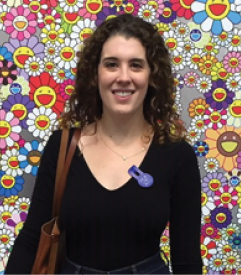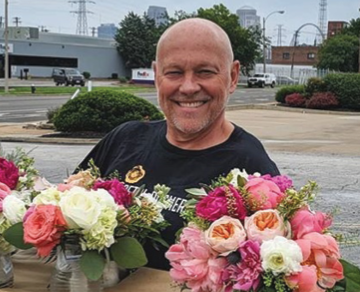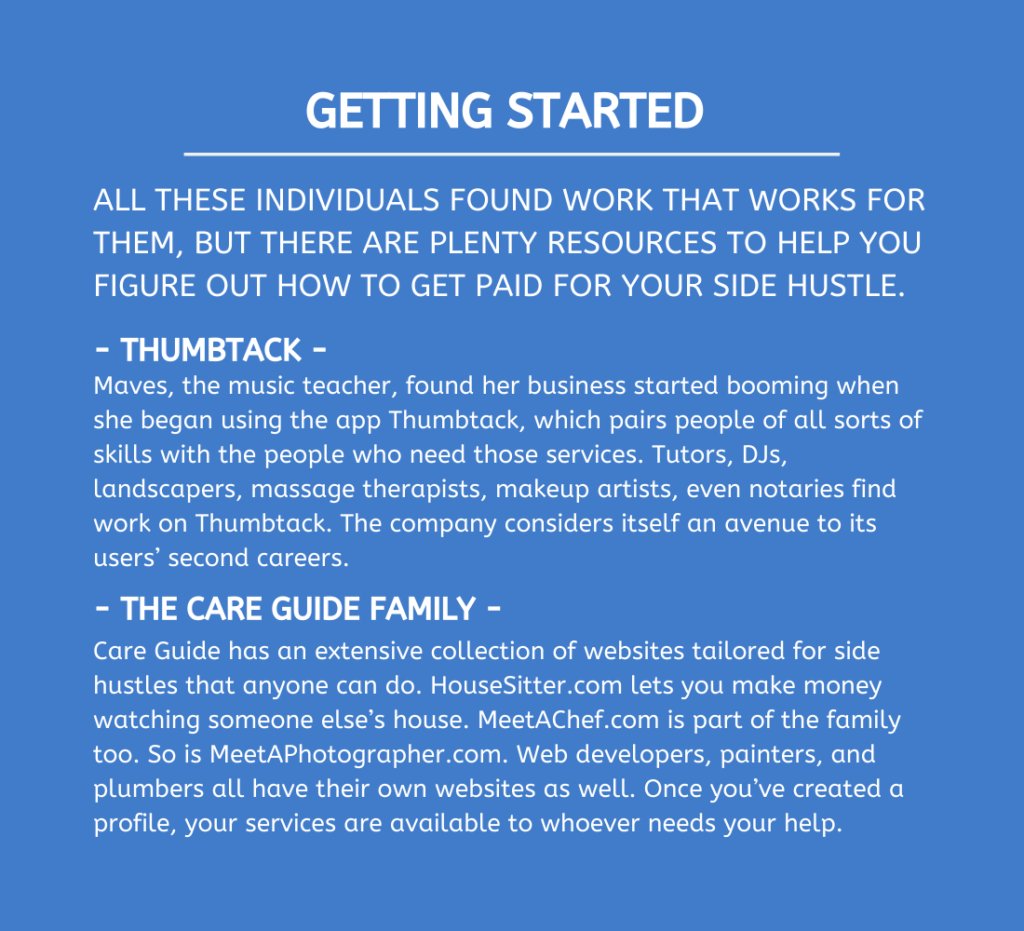Supplemental income is more available than ever. But the spirit of the side hustle is about more than clocking out of one job only to clock right back into another. For most people, the time away from their full-time jobs is the only time that is truly theirs to use as they please.
Lucrative or not, do we actually want to spend that time doing whatever boring work some giant corporation is willing to outsource to us?
Instead, many side hustlers are figuring out how to monetize the things they already want to explore in their free time. What follows is a collection of people who clock out of their full-time jobs only to hop into side hustles that they’re passionate about, learn from, or meet new people through, as well as a few resources to help you build your own side hustle. From savvy freelancers to small business owners to a guy who gets paid to create explosions, you don’t necessarily need to do what they do, but if you can think like they think, you might find that there’s money to be found in your own creative spirit.
Type 1 // Own What You Already Know

Matt Giles is part of the editorial team behind the popular storytelling site Longreads. Writing and editing are elemental parts of journalism, but a key responsibility for Giles is fact-checking, and it’s one that he can utilize outside of his full-time job. So, Giles lends his attention to detail as a freelance fact-checker for a number of publications including The New York Times and the Huffington Post.
When you read a lengthy, reported story in a credible magazine, newspaper, or website, you might not realize the lengths taken to ensure factual accuracy. The work that Giles does when he is brought in on a story goes beyond simply double-checking facts; fact-checkers often fully re-report stories from a new perspective. “It’s our job to make sure each detail in a piece checks out,” Giles says. To be able to make extra income by incorporating new stories into his free time is not only practical, it drops fascinating narratives right into his lap for him to explore. “You’re learning something new every single day.”

Jamie Serrano was just looking for a specific dress to wear for the rehearsal dinner before her wedding. It was sold out, but she ultimately found it in one of Facebook’s Buy/Sell/Trade groups, a resource for individuals to sell belongings that they no longer want. In the process, she realized that articles of clothing—the kinds of brands and styles that she owned but wasn’t regularly wearing—were selling for surprising amounts of money. So she dived into a flexible but time consuming world of taking photos, posting details, and negotiating prices.
“At first I loved it because it was a way to declutter and really pare down my closet,” she says. Over time, Serrano, a writer by day, started looking at it almost as a side business. It requires planning and attentiveness, but, “If you have a penchant for shopping like I do, it’s a great way to make extra money,” she says.

There was a time when Ann Bush worked in accounting. Now, she makes accounting work for her. Bush has a master’s degree in accounting and spent seven years as an auditor and property accountant for two big corporations. She was good at the work, but felt trapped in the company structures. “I was pretty miserable at my job,” she says. Frankly, her work wasn’t personal, so in 2014 she decided to make it personal. Recently married, and with an eye on starting a family, she started Arrow Books, a bookkeeping and consulting company, and she remains the sole employee.
Six years later, Bush is a mother of two young children, and Arrow Books has a stable of clients for which she prepares financial statements every month. Bush is free to treat her young sons, Jack and Finn, like full-time jobs, while having to answer to no one but her clients. “I’m able to pop open my laptop and get an hour in very early or another chunk of work during naptime.”
Type 2 // Carve Out Another Identity

Information technology is a great career field to get into, but Ken Mahne found that of the many skills deployed in his full-time IT job, creativity wasn’t high on the list. So he found himself arranging flowers for his wife, Cyndi, as a creative outlet.
Ten years ago, when one of her co-workers saw a centerpiece on her desk, she inquired whether Ken would do the flower arrangements for her daughter’s wedding. It went well, and Ken and Cyndi started Petal Pushers, a floral arrangement company in St. Louis, Missouri. Word-of-mouth spread slowly but surely. The following year they did two weddings. The year after that they did 12. The next year 22. Now, they average 58 weddings a year without interfering with his job in IT. “It’s just a joy to know that I built up this little side business that makes people happy and allows me to be creative,” Mahne says. It’s a demanding job, but Cyndi says, “We still tear up when we get to watch a girl walk down the aisle.”

Bobby Karalla works in the digital department of an NBA team; what a lot of people might consider an exciting full-time job. But his side hustle is the gig that can really get his adrenaline going. When his schedule allows, he works for a fireworks display company as their “lead shooter,” which means when the explosions begin, he has the remote control in his hands. But the work starts well before he presses a button. “Seeing [fireworks] from this side has really opened my eyes to how intricate and detailed a production it is and how much work goes into a 20-minute show for thousands of people,” Karalla says.
Karalla became a licensed technician, and works with a team of people who make sure that everyone nearby is safe and everyone from a distance sees something spectacular. He just happens to have the show’s best view. “I think everyone gets a little tired of working inside an office all day, even if your office is a basketball court or a 20,000-seat arena,” Karalla says. “It’s exhilarating to hear one boom after the next. You can feel it in your gut.”
Discipline, leadership, motivation and work ethic are the kind of traits that Jeff Avanzato has developed in his 24-year career in the Air Force. So you probably wouldn’t guess that on the weekends he gets paid to make people dance. Avanzato always had a love for music, so he created an after-work persona called DJ Zato, and learned skills he’d never develop in the military. “You need to understand the art of playing to the crowd,” Avanzato says. Eventually he started Network DJs to serve weddings and other events in Alabama and Kentucky. “The stresses of my current job in the Air Force are relieved when I have my headphones on and I’m doing my thing.”
Type 3 // Improve Yourself in the Process
Camille Williams is a first-grade teacher, a job that’s both a calling and a trial on anyone’s patience. When Williams began looking for avenues to make additional income, barre, a fitness program that combines elements of yoga, pilates and ballet, stood out to her. To become a barre instructor required an extensive five-month training and certification process, but it’s a responsibility that came with its own perks. “I get to work out for free, which I love, be around people more than 7 years old, and wear workout clothes to work,” Williams says. She’s able to lead courses after school or on the weekends.
Hearing her talk about her side hustle sounds a lot like how you’d expect her to talk about her full-time job. “I’m challenged to create fluid, diverse class plans,” she says. “It’s become one of the greatest joys I never knew I needed.”
Alli Becker is a registered nurse in New York City, who’s simultaneously pursuing a master’s degree. Spare time isn’t something she has a great deal of. Looking for a way to alleviate the inevitable stresses of her job, she became a dog walker for Wag!, an app that pairs walkers with dog owners. “The flexible schedule and quality pooch time was very appealing,” Becker says. Some weeks, dog-walking has to take a backseat to work or school or life, but even if she makes enough just to afford her a guilt-free cocktail or two at the end of the week, it can be a nice way to break up her schedule. “Another great aspect is having an excuse to travel around the city and explore different neighborhoods while getting some steps in,” she says.
Music is a skill meant to be shared. Michelle Maves has been providing piano and voice lessons for over 10 years. It’s a personal experience, in which you get to witness the musical growth of a student. It helped her support herself through college and provided additional income through an acting career. She’s found students to teach while living in Chicago, Los Angeles and New York. It was such a consistent side hustle that over the years it eventually blossomed into her full-time job.

Related: The Side Hustler’s Handbook
This article originally appeared in the May/June 2020 issue of SUCCESS magazine.
Photo by GaudiLab/Shutterstock.com










